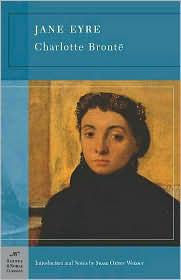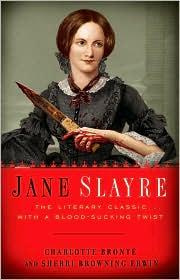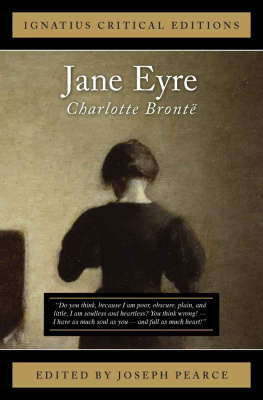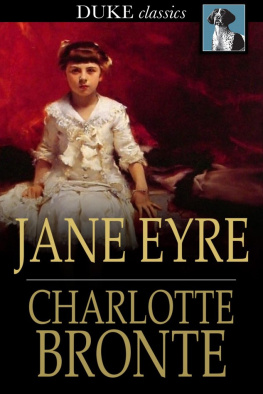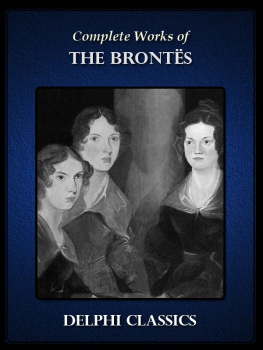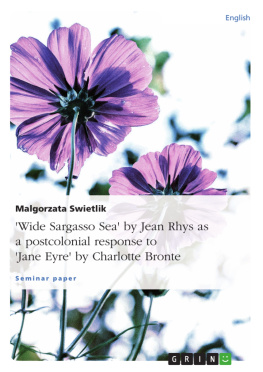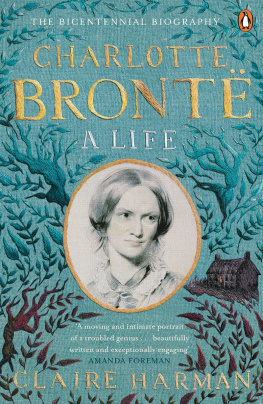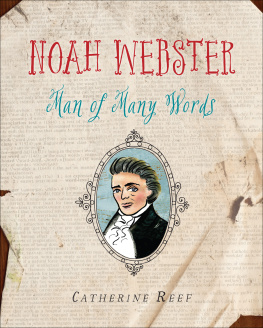Charlotte Brontë - Jane Eyre (Modern Library)
Here you can read online Charlotte Brontë - Jane Eyre (Modern Library) full text of the book (entire story) in english for free. Download pdf and epub, get meaning, cover and reviews about this ebook. year: 2000, publisher: Random House, genre: Detective and thriller. Description of the work, (preface) as well as reviews are available. Best literature library LitArk.com created for fans of good reading and offers a wide selection of genres:
Romance novel
Science fiction
Adventure
Detective
Science
History
Home and family
Prose
Art
Politics
Computer
Non-fiction
Religion
Business
Children
Humor
Choose a favorite category and find really read worthwhile books. Enjoy immersion in the world of imagination, feel the emotions of the characters or learn something new for yourself, make an fascinating discovery.

- Book:Jane Eyre (Modern Library)
- Author:
- Publisher:Random House
- Genre:
- Year:2000
- Rating:5 / 5
- Favourites:Add to favourites
- Your mark:
- 100
- 1
- 2
- 3
- 4
- 5
Jane Eyre (Modern Library): summary, description and annotation
We offer to read an annotation, description, summary or preface (depends on what the author of the book "Jane Eyre (Modern Library)" wrote himself). If you haven't found the necessary information about the book — write in the comments, we will try to find it.
Jane Eyre (Modern Library) — read online for free the complete book (whole text) full work
Below is the text of the book, divided by pages. System saving the place of the last page read, allows you to conveniently read the book "Jane Eyre (Modern Library)" online for free, without having to search again every time where you left off. Put a bookmark, and you can go to the page where you finished reading at any time.
Font size:
Interval:
Bookmark:
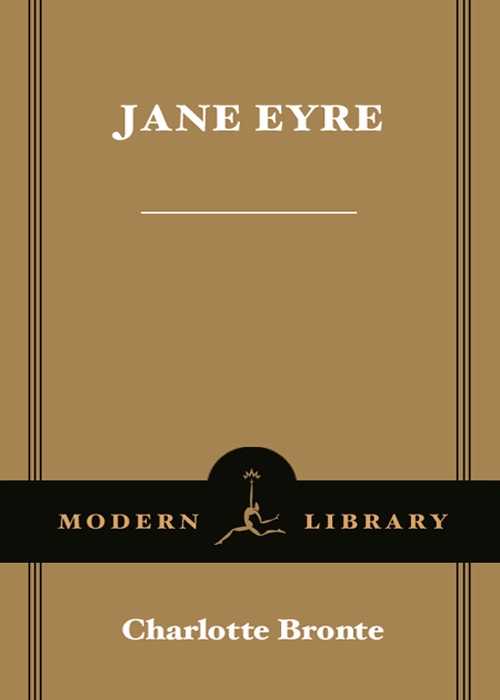
CONTENTS
Preface
........................
 preface to the first edition of Jane Eyre being unnecessary, I gave none: this second edition demands a few words both of acknowledgment and miscellaneous remark.
preface to the first edition of Jane Eyre being unnecessary, I gave none: this second edition demands a few words both of acknowledgment and miscellaneous remark.
My thanks are due in three quarters.
To the Public, for the indulgent ear it has inclined to a plain tale with few pretensions.
To the Press, for the fair field its honest suffrage has opened to an obscure aspirant.
To my Publishers, for the aid their tact, their energy, their practical sense, and frank liberality have afforded an unknown and unrecommended Author.
The Press and the Public are but vague personifications for me, and I must thank them in vague terms; but my Publishers are definite: so are certain generous critics who have encouraged me as only large-hearted and high-minded men know how to encourage a struggling stranger; to them, i.e., to my Publishers and the select Reviewers, I say cordially, Gentlemen, I thank you from my heart.
Having thus acknowledged what I owe those who have aided and approved me, I turn to another class; a small one, so far as I know, but not, therefore, to be overlooked. I mean the timorous or carping few who doubt the tendency of such books as Jane Eyre: in whose eyes whatever is unusual is wrong; whose ears detect in each protest against bigotrythat parent of crimean insult to piety, that regent of God on earth. I would suggest to such doubters certain obvious distinctions; I would remind them of certain simple truths.
Conventionality is not morality. Self-righteousness is not religion. To attack the first is not to assail the last. To pluck the mask from the face of the Pharisee, is not to lift an impious hand to the Crown of Thorns.
These things and deeds are diametrically opposed; they are as distinct as is vice from virtue. Men too often confound them; they should not be confounded: appearance should not be mistaken for truth; narrow human doctrines, that only tend to elate and magnify a few, should not be substituted for the world-redeeming creed of Christ. There isI repeat ita difference; and it is a good, and not a bad action to mark broadly and clearly the line of separation between them.
The world may not like to see these ideas dissevered, for it has been accustomed to blend them; finding it convenient to make external show pass for sterling worthto let white-washed walls vouch for clean shrines. It may hate him who dares to scrutinise and exposeto rase the gilding, and show base metal under itto penetrate the sepulchre, and reveal charnel relics: but, hate as it will, it is indebted to him.
Ahab did not like Micaiah, because he never prophesied good concerning him, but evil: probably he liked thesycophant son of Chenaanah better; yet might Ahab have escaped a bloody death, had he but stopped his ears to flattery, and opened them to faithful counsel.
There is a man in our own days whose words are not framed to tickle delicate ears: who, to my thinking, comes before the great ones of society, much as the son of Imlah came before the throned Kings of Judah and Israel; and who speaks truth as deep, with a power as prophet-like and as vitala mien as dauntless and as daring. Is the satirist of Vanity Fair admired in high places? I cannot tell; but I think if some of those amongst whom he hurls the Greek fire of his sarcasm, and over whom he flashes the levin-brand of his denunciation, were to take his warnings in timethey or their seed might yet escape a fatal Ramoth-Gilead.
Why have I alluded to this man? I have alluded to him, Reader, because I think I see in him an intellect profounder and more unique than his contemporaries have yet recognised; because I regard him as the first social regenerator of the dayas the very master of that working corps who would restore to rectitude the warped system of things; because I think no commentator on his writings has yet found the comparison that suits him, the terms which rightly characterise his talent. They say he is like Fielding: they talk of his wit, humour, comic powers. He resembles Fielding as an eagle does a vulture: Fielding could stoop on carrion, but Thackeray never does. His wit is bright, his humour attractive, but both bear the same relation to his serious genius, that the mere lambent sheet-lightning playing under the edge of thesummer-cloud, does to the electric death-spark hid in its womb. Finally, I have alluded to Mr. Thackeray, because to himif he will accept the tribute of a total strangerI have dedicated this second edition of Jane Eyre.
Currer Bell.
Dec. 21st, 1847.
NOTE TO THE THIRD EDITION
I avail myself of the opportunity which a third edition of Jane Eyre affords me, of again addressing a word to the Public, to explain that my claim to the title of novelist rests on this one work alone. If, therefore, the authorship of other works of fiction has been attributed to me, an honour is awarded where it is not merited; and consequently, denied where it is justly due.
This explanation will serve to rectify mistakes which may already have been made, and to prevent future errors.
Currer Bell.
April 13th, 1848.
J ANE E YRE
INTRODUCTION
by Diane Johnson
In 1847, the stormy tale of the passionate orphan girl Jane Eyre went immediately to the heart of the British public, bringing tears to the eyes of even hard-bitten readers like William Makepeace Thackeray. And because of the strongly autobiographical effect of the novel, told in Janes compelling words, the identity and gender of the mysterious Currer Bell, who called himself the editor, was a topic of speculation. Some reviewers felt that if Currer Bell were a woman, she must be one who had forfeited the society of her own sex, in other words, a fallen woman.
Indeed most people thought Jane Eyre could not have been written by a female, for though the gender of the name Currer Bell was ambiguous, the mind behind it seemed decidedly masculine in its rebelliousness, its intimations of sexuality, and the mention of indelicate matters like the morals of Mr. Rochesters first wife. When Jane Eyre reproaches her powerful and rich employer with underrating her because she is poor, plain and little, it was at once shocking and endearing, to her contemporaries as to us, if only because at one time or another most people have felt themselves to be similarly powerless.
Endearing and shocking too when as a child she tells the bullying clergyman Mr. Brocklehurst that the way to avoid hell is to be careful not to die. Such protest and defiance, and such candor, were not expected from docile Victorian girls. But even the publishers at Smith, Elder inLondon had no idea from the rather unrevealing, businesslike letters they received from time to time from the secretive, undeniably gifted author who he, or she, could be.
She was Charlotte Bront, eldest of the three brilliant Bront sisters, whose masterpieces and brief lives are among the most affecting in English literary history. The six Bront children were raised in Haworth, a gloomy village on the moors of Yorkshire near Bradford, where their father, an eccentric country parson, had the modest living of the parish church. Behind the church and parsonage rises the wild Pennistone Moor where they wandered as Jane does in Jane Eyre, and as the characters do in Emily Bronts Wuthering Heights. In harsh weather they had nothing to do but read.
Their mother died early. Four of the sisters were sent to a school for clergymens daughters, the now infamous Cowan Bridge school, where Maria and Elizabeth, aged ten and twelve, fell fatally ill. The surviving sisters, Emily and Charlotte, who were six and eight years old, were immediately brought home to Haworth, where with the younger Anne, and Branwell, the only boy, they would be raised by their father, an aunt, and an old servant.
Next pageFont size:
Interval:
Bookmark:
Similar books «Jane Eyre (Modern Library)»
Look at similar books to Jane Eyre (Modern Library). We have selected literature similar in name and meaning in the hope of providing readers with more options to find new, interesting, not yet read works.
Discussion, reviews of the book Jane Eyre (Modern Library) and just readers' own opinions. Leave your comments, write what you think about the work, its meaning or the main characters. Specify what exactly you liked and what you didn't like, and why you think so.

